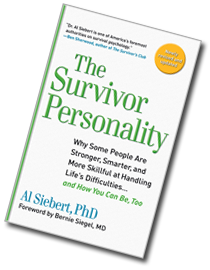He Surprised Them All - Allen Sawyers' Story
by Cynthia C. Dailey-Hewkin
THRIVEnet Story of the Month - May 1999
Allen Sawyers was on his way from Grants Pass, Oregon, to Crescent City, California, driving the Toyota pickup he had purchased the day before. Rain was falling in sheets, distorting his vision. As Allen proceeded along the highway he collided head on with another truck. Allen was knocked unconscious with a severe head injury. An ambulance raced him to the hospital with siren blaring.
Fourteen years have gone by, and to this day, details of the accident are unclear. Allen's mother recalls that the first time she saw him in the hospital after the accident he was in a coma in the intensive care unit. He was all wired up, had a tracheotomy tube in his throat, and was lying on a cooling mattress. He had suffered an injury to his brain stem, and the thermostat in his body was not functioning. Allen was fortunate in that he received special attention from an excellent medical team and one of the best physicians in the country - the same doctor who had been called in to attend John F. Kennedy when he was shot.
Upon advice from the hospital medical team, family members were encouraged to talk to Allen (while he was unconscious) in the present tense as if he could hear them. This same type of treatment had proved helpful for Allen's mother when she was recovering from a 54 day coma resulting from similar injuries suffered in an accident in 1945.
Family members took turns talking to and staying with him 24 hours a day. He was unconscious, in a complete coma for 85 days. Then he alternated in and out of consciousness. During this time the medical team did not offer much hope to the family. Their comments at first were: "Allen will not live." But when he did not die after many weeks, the comments became "Allen will live but he will be a vegetable." After he regained consciousness three months later, the comments became: "He will live but he will never get out of a wheel chair."
Allen needed special therapists, but they could only travel within a certain area to provide services. A cousin of Allen's who lived closer to the therapists' clinic cleaned up a space in his basement and set up special equipment so Allen could come and live there. Physical therapists and speech therapists came to the house to treat him. He could speak barely above a whisper. This was devastating for someone who had possessed a wonderful speaking voice and his own radio and TV shows while he was in high school.
After the therapists had worked with Allen about two months they found an opening for him in a rehabilitation institute. There he was made to be responsible for himself and expected to be places on time, though he continued having trouble with his memory.
At this same time the family decided to try having Allen hypnotized to see if he could recall details of the accident. Little by little Allen started recalling details leading up to the accident and people talking to him in the ambulance, but he could not remember the accident itself.
Allen went to live with his sister during the school year and began attending a junior college, in the disabled student program. It was a tremendous physical, mental, and emotional challenge for him. He began by taking one class at a time to see if he could handle it. He took a tape recorder to class with him so that he could listen to the tape later to remember what the lecture was about. Other students would walk him to class because he couldn't remember where the classrooms were located. He had tutors help him go over his notes and prepare for tests.
After two years had gone by Allen moved back home with his parents. He began water therapy (swimming) and continued with speech therapy. He was encouraged to talk louder and slower and work on his breathing.
Allen enrolled in Tai Chi classes at a local community college. He began learning a computer program called "Brain Train" - especially created for people with brain injuries. He began using a system of landmarks to help him find his classrooms. After class he found he had trouble remembering where he had parked his car.
Today Allen can recall numbers but has trouble remembering the days of the week. He wears a watch that helps remind him. He has a driver's license and has worked as a volunteer for his county providing transportation for others. He lives alone, cooks, pays his own bills, takes Tai Chi classes, and works as a volunteer in a museum.
Allen says this accident is the best thing that ever happened to him. He now appreciates everything more and considers every day a gift.
He can do almost anything, but Allen has learned that he may not be able to do it in the same way as others. He has learned how to get on a bicycle without losing his balance. While he was working for a thrift shop he had trouble remembering which shelves to put certain items on. The employer attached signs to help Allen, and the signs in turn made shopping easier for the customers.
Allen's old habits and attitudes have improved since his accident. Now he believes the possibilities are unlimited if he will but make the effort. Allen gives the following advice to anyone suffering a severe physical injury: "Don't give up. If you give up you will never get anywhere. Remember - a journey of a thousand miles begins with a single step."
